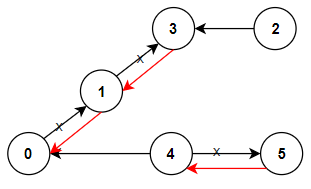


题目描述
n 座城市,从 0 到 n-1 编号,其间共有 n-1 条路线。因此,要想在两座不同城市之间旅行只有唯一一条路线可供选择(路线网形成一颗树)。去年,交通运输部决定重新规划路线,以改变交通拥堵的状况。
路线用 connections 表示,其中 connections[i] = [a, b] 表示从城市 a 到 b 的一条有向路线。
今年,城市 0 将会举办一场大型比赛,很多游客都想前往城市 0 。
请你帮助重新规划路线方向,使每个城市都可以访问城市 0 。返回需要变更方向的最小路线数。
题目数据 保证 每个城市在重新规划路线方向后都能到达城市 0 。
示例 1:

输入:n = 6, connections = [[0,1],[1,3],[2,3],[4,0],[4,5]]
输出:3
解释:更改以红色显示的路线的方向,使每个城市都可以到达城市 0 。
示例 2:

输入:n = 5, connections = [[1,0],[1,2],[3,2],[3,4]]
输出:2
解释:更改以红色显示的路线的方向,使每个城市都可以到达城市 0 。
示例 3:
输入:n = 3, connections = [[1,0],[2,0]]
输出:0
提示:
2 <= n <= 5 * 10^4connections.length == n-1connections[i].length == 20 <= connections[i][0], connections[i][1] <= n-1connections[i][0] != connections[i][1]
解法
方法一:DFS
题目给定的路线图中有 $n$ 个节点和 $n-1$ 条边,如果我们忽略边的方向,那么这 $n$ 个节点构成了一棵树。而题目需要我们改变某些边的方向,使得每个节点都能到达节点 $0$。
我们不妨考虑从节点 $0$ 出发,到达其他所有节点。方向与题目描述相反,意味着我们在构建图的时候,对于有向边 $[a, b]$,我们应该视为有向边 $[b, a]$。也即是说,如果要从 $a$ 到 $b$,我们需要变更一次方向;如果要从 $b$ 到 $a$,则不需要变更方向。
接下来,我们只需要从节点 $0$ 出发,搜索其他所有节点,过程中,如果遇到需要变更方向的边,则累加一次变更方向的次数。
时间复杂度 $O(n)$,空间复杂度 $O(n)$。其中 $n$ 是题目中节点的数量。
| class Solution:
def minReorder(self, n: int, connections: List[List[int]]) -> int:
def dfs(a: int, fa: int) -> int:
return sum(c + dfs(b, a) for b, c in g[a] if b != fa)
g = [[] for _ in range(n)]
for a, b in connections:
g[a].append((b, 1))
g[b].append((a, 0))
return dfs(0, -1)
|
1
2
3
4
5
6
7
8
9
10
11
12
13
14
15
16
17
18
19
20
21
22
23
24
25 | class Solution {
private List<int[]>[] g;
public int minReorder(int n, int[][] connections) {
g = new List[n];
Arrays.setAll(g, k -> new ArrayList<>());
for (var e : connections) {
int a = e[0], b = e[1];
g[a].add(new int[] {b, 1});
g[b].add(new int[] {a, 0});
}
return dfs(0, -1);
}
private int dfs(int a, int fa) {
int ans = 0;
for (var e : g[a]) {
int b = e[0], c = e[1];
if (b != fa) {
ans += c + dfs(b, a);
}
}
return ans;
}
}
|
1
2
3
4
5
6
7
8
9
10
11
12
13
14
15
16
17
18
19
20
21 | class Solution {
public:
int minReorder(int n, vector<vector<int>>& connections) {
vector<pair<int, int>> g[n];
for (auto& e : connections) {
int a = e[0], b = e[1];
g[a].emplace_back(b, 1);
g[b].emplace_back(a, 0);
}
function<int(int, int)> dfs = [&](int a, int fa) {
int ans = 0;
for (auto& [b, c] : g[a]) {
if (b != fa) {
ans += c + dfs(b, a);
}
}
return ans;
};
return dfs(0, -1);
}
};
|
1
2
3
4
5
6
7
8
9
10
11
12
13
14
15
16
17
18 | func minReorder(n int, connections [][]int) int {
g := make([][][2]int, n)
for _, e := range connections {
a, b := e[0], e[1]
g[a] = append(g[a], [2]int{b, 1})
g[b] = append(g[b], [2]int{a, 0})
}
var dfs func(int, int) int
dfs = func(a, fa int) (ans int) {
for _, e := range g[a] {
if b, c := e[0], e[1]; b != fa {
ans += c + dfs(b, a)
}
}
return
}
return dfs(0, -1)
}
|
1
2
3
4
5
6
7
8
9
10
11
12
13
14
15
16
17 | function minReorder(n: number, connections: number[][]): number {
const g: [number, number][][] = Array.from({ length: n }, () => []);
for (const [a, b] of connections) {
g[a].push([b, 1]);
g[b].push([a, 0]);
}
const dfs = (a: number, fa: number): number => {
let ans = 0;
for (const [b, c] of g[a]) {
if (b !== fa) {
ans += c + dfs(b, a);
}
}
return ans;
};
return dfs(0, -1);
}
|
1
2
3
4
5
6
7
8
9
10
11
12
13
14
15
16
17
18
19
20
21 | impl Solution {
pub fn min_reorder(n: i32, connections: Vec<Vec<i32>>) -> i32 {
let mut g: Vec<Vec<(i32, i32)>> = vec![vec![]; n as usize];
for e in connections.iter() {
let a = e[0] as usize;
let b = e[1] as usize;
g[a].push((b as i32, 1));
g[b].push((a as i32, 0));
}
fn dfs(a: usize, fa: i32, g: &Vec<Vec<(i32, i32)>>) -> i32 {
let mut ans = 0;
for &(b, c) in g[a].iter() {
if b != fa {
ans += c + dfs(b as usize, a as i32, g);
}
}
ans
}
dfs(0, -1, &g)
}
}
|




